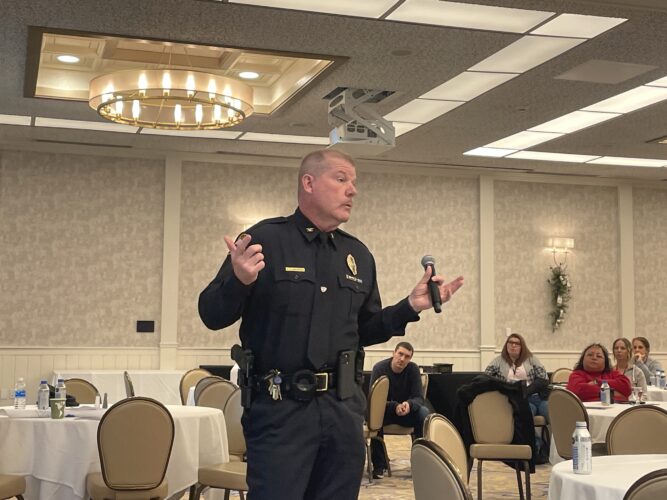
photo by: Emma Delk
Wheeling Police Chief Shawn Schwertfeger explains how the Crisis Intervention Team’s training gave him the ability to de-escalate situations involving subjects in mental health crisis during the Recovery Conference by peers Tuesday at Oglebay Park.
Wheeling Police Chief Shawn Schwertfeger and Northwood Health Systems Director of Crisis Services Kristy Myers discussed the life-saving capabilities of CIT programs at the second annual Peer Recovery Conference to inspire addiction treatment specialists from across the state to launch their own.
Held in Oglebay Park, the Peer Recovery Conference brings together peer support specialists and recovery coaches from across West Virginia to share information about addiction and treatment.
Leading the creation of the WPD’s Crisis Intervention Team, Schwertfeger explained that CIT programs seek to limit officers’ use of deadly force in their interactions with subjects suffering from addiction. During 40 hours of training, officers learn how to properly handle drug-related situations in order to direct the subject to appropriate treatment, avoiding placement in the criminal justice system.
Northwood Health System’s Crisis Stabilization Units work hand-in-hand with the WPD to implement the program. Myers explained that they respond to calls from the WPD to provide assistance in managing people experiencing a mental health crisis.
“Our goal is to meet that person where they are, guide them through the crisis and direct them to services,” Myers said. “The goal is to be able to stabilize them again and then direct them to outpatient services. »
Highlighting the importance of CIT programs, Schwertfeger shared stories from his time as an officer with the Virginia Police Department. After completing CIT training there, Schwertfeger found he was better equipped to de-escalate situations with people in mental health crises.
Witnessing the positive impact of addressing addiction issues with compassion, Schwertfeger is now working to spread the CIT initiative he brought to Wheeling to the rest of the state.
During their presentation, audience members asked questions regarding the logistics of launching a CIT program in their region. A peer recovery coach wondered how they could get support from the local police force to get started.
“What I tell police chiefs is, ‘If you’re truly a responsible leader who cares about your community, why don’t you start one?’ said Schwertfeger. “You need to let them know that right now we have a duty to everyone, including our own staff, to try to minimize these types of undesirable outcomes. »
Some spectators had already moved into action by Schwertfeger’s words. Parkersburg area peer recovery coaches Emily Proscia and Sara Smith had begun taking steps to implement a CIT program in their town, with Smith contacting the Parkersburg police chief to create one.
Admitting that the topic irks her a little, Proscia thinks her city would “absolutely” benefit from a CIT program, as she has witnessed the deadly consequences that can result when officers don’t know how to handle people dealing with a addiction.
“I’ve had situations with police where they weren’t trained for scenarios involving drug abuse, and lives were lost,” Proscia said.
Both hope that implementing a CIT program in their city will change not only the way police treat drug users, but the rest of the population as well.
“There’s definitely a lot of stigma in our city when it comes to addiction,” Smith said. “Seeing the negativity surrounding people suffering from addiction through things like “Scanner Talk” groups on Facebook has been so sad and hurtful. »
The public beginning to recognize the gentler approach Wheeling police are now taking in treating drug addicts has demonstrated to Schwertfeger just how much the program is paying off.
“People stop me all the time and tell me the Wheeling Police Department has changed,” he said. “I hear that because they see a professional police force with officers who no longer go into situations thinking, ‘I’m going to show up and take someone to jail.’ It’s more compassionate now because we listen to individuals to try to find other ways to help them rather than resorting to deadly force.
